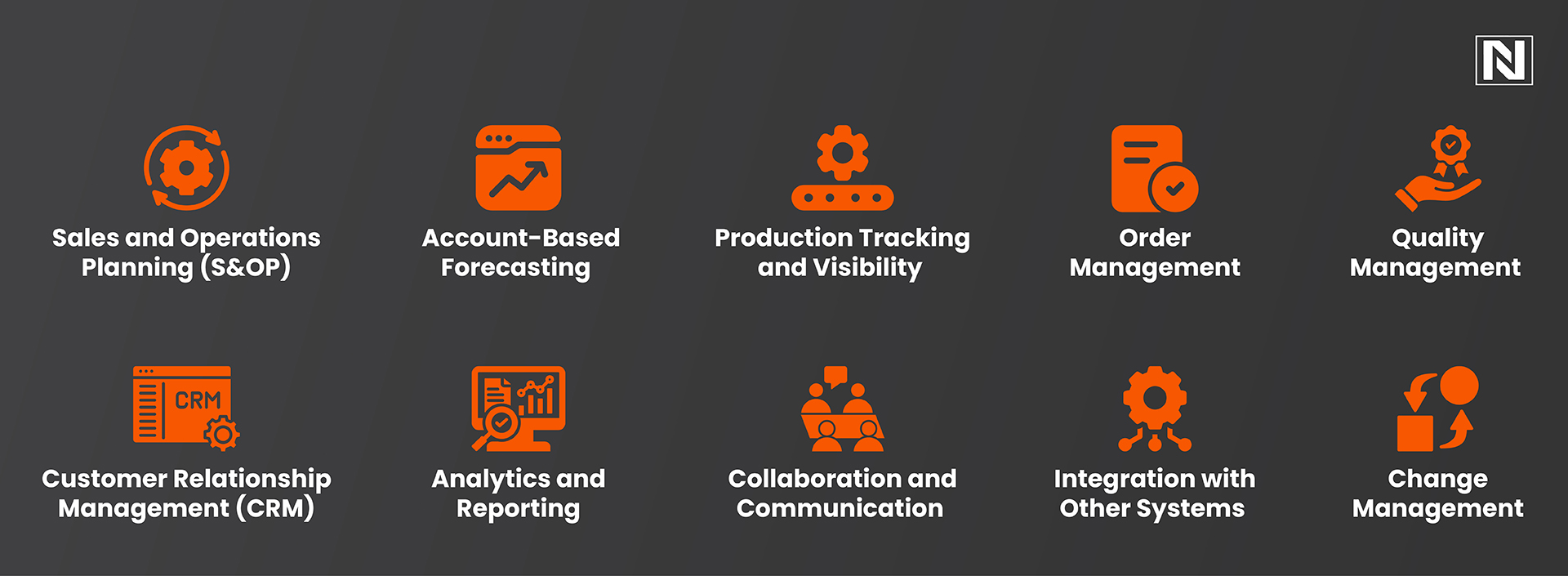
According to McKinsey, research indicates that a single negative experience can drive away 25% of customers.
In the aftermath of the COVID-19 pandemic and various global disruptions, manufacturers have recognized the critical role of exceptional customer and partner experiences. It’s no longer just about the product or its delivery; the focus now extends to the entire journey from initial contact to post-delivery interactions.
While ERP solutions are effective for managing the logistics of manufacturing and addressing the “who, what, when, and where,” CRM software like Salesforce excels in tackling the more personal aspects of the process, specifically the “how and why.”
Manufacturing companies leverage CRM systems’ forecasting, lead conversion, and sales satisfaction capabilities to ensure seamless operations both internally and externally. This is where Salesforce Manufacturing Cloud comes into play, providing a robust platform specifically designed for the sector’s unique challenges.
What is Salesforce Manufacturing Cloud?
It is a cloud-based solution designed to streamline manufacturing business operations. It offers a range of features to enhance efficiency, including:
1. Department Connectivity: Facilitates seamless communication between front-office and back-office teams, boosting collaboration and transparency.
2. Customer Service Management: Manages the entire customer service lifecycle effectively.
3. Forecasting Capabilities: Generates forecasts for critical revenue metrics.
4. Business Insights Analysis: Utilizes Einstein Analytics to deliver valuable insights into sales agreement compliance, account health, pricing strategies, and product performance.
5. System Integration: Easily integrates with existing back-office systems such as ERP (Enterprise Resource Planning) and OMS (Order Management Systems).
Built on the Salesforce Customer 360 platform, Manufacturing Cloud also integrates with Sales and Service Clouds. Its diverse features include:
1. Sales Agreements: Offers a comprehensive view of planned volumes and revenues compared to actual orders.
2. Account-Based Forecasting: Provides insights across both new and ongoing business.
3. Prebuilt Objects and Processes: Features ready-to-use objects, processes, and frameworks specifically tailored for manufacturers.
4. Low-Code Tools and Embedded AI: Incorporates low-code development tools and AI capabilities for enhanced functionality.
5. Agentforce & AI App Development: Empowers users to build and expand Agentforce and AI applications using low-code solutions.
6. Customization Options: Enables users to tailor the implementation to fit their specific requirements.
Benefits of Salesforce for the Manufacturing Industries
Salesforce Manufacturing Cloud offers numerous benefits tailored to the unique challenges and requirements of the manufacturing industry. Here are some key advantages:

- Strengthened Customer Relationships
Salesforce Manufacturing Cloud is a unified platform that allows manufacturers to manage customer interactions efficiently. By capturing and analyzing data on lead sources, exchanges, and outcomes, manufacturers can refine their sales and marketing tactics, leading to higher conversion rates and revenue.
This platform helps cultivate strong, lasting customer relationships, enhances overall experiences, builds loyalty, and streamlines grievance resolution and data management.
- Streamlined Sales and Lead Management
Salesforce Manufacturing Cloud provides a centralized system for tracking and managing leads, which enhances lead performance and conversion rates, ultimately boosting profits. By capturing critical data from lead sources, interactions, and outcomes, manufacturers can fine-tune their sales and marketing strategies.
This enables them to identify high-quality leads and focus their efforts on those with the greatest conversion potential, saving valuable time and resources.
- Real-Time Data Insights
A standout feature of Salesforce Manufacturing Cloud is its capacity to deliver real-time data insights. With cutting-edge analytics and forecasting capabilities, manufacturers can make informed predictions grounded in historical data, market trends, and customer insights.
These insights inform resource planning, production volumes, and sales strategies, allowing manufacturers to make data-driven decisions that effectively respond to customer demands, minimize excess inventory, and prevent stock shortages.
- Inventory and Supply Chain Optimization
Automated alerts within Salesforce ensure timely replenishment, help avoid stockouts, lower carrying costs, and provide real-time inventory visibility across multiple locations. This system empowers businesses to plan production and make informed strategic order fulfillment decisions.
- Efficient Field Service Management
By maintaining a centralized database for customer information, service requests, and case management, manufacturers can effectively assist customers, track service progress, and resolve issues swiftly. Salesforce automation directs service requests to the appropriate teams or technicians, ensuring prompt responses and efficient resolutions.
- Scalability and Customization
Salesforce Manufacturing Cloud boasts scalable and customizable features that integrate seamlessly with existing systems, facilitating smooth data and process transitions. It easily connects with CRM or ERP systems while allowing businesses to retain preferred tools and workflows. The platform’s scalability adapts to evolving needs and growing operations.
- Enhanced Collaboration
Salesforce Manufacturing Cloud fosters collaboration by dismantling departmental silos. It links sales, service, and operations teams, enabling them to share customer information and real-time production statuses effortlessly.
The Fact of the Day
According to Statista, Salesforce captured around 22% of the global CRM applications market In 2023.
Use Cases of Salesforce Manufacturing Cloud
Salesforce Manufacturing Cloud is designed to streamline operations and enhance collaboration in the manufacturing sector. Here are some key use cases illustrating how organizations can leverage its features:

- Sales and Operations Planning (S&OP)
Salesforce Manufacturing Cloud empowers manufacturers to streamline their Sales and Operations Planning by facilitating precise demand forecasting through comprehensive analysis of historical sales data and market trends.
By creating a cohesive plan that aligns production schedules with real-time customer demand, organizations can enhance their responsiveness to market fluctuations.
- Account-Based Forecasting
This advanced feature allows manufacturers to implement account-based forecasting, which tailors insights and predictions to the specific needs of key customer accounts. By analyzing customer behavior and preferences, organizations can anticipate individual requirements and customize their offerings accordingly.
- Production Tracking and Visibility
Salesforce Manufacturing Cloud offers real-time visibility into production processes and inventory levels, enabling manufacturers to maintain optimal stock levels and streamline operations. By continuously monitoring production activities, organizations can swiftly identify and resolve bottlenecks or delays, ensuring that production schedules remain on track.
- Order Management
The platform’s robust order management capabilities automate workflows, significantly reducing manual errors and expediting the order fulfillment process. By streamlining order processing, manufacturers can improve operational efficiency while ensuring timely delivery to customers.
Additionally, real-time order status updates provide transparency for customers, enhancing their experience and satisfaction by keeping them informed throughout the fulfillment journey.
- Quality Management
Salesforce Manufacturing Cloud facilitates rigorous quality management by integrating quality control measures throughout the production lifecycle. By systematically tracking quality metrics and implementing proactive measures, manufacturers can ensure compliance with industry standards and customer expectations.
When quality issues arise, the platform enables swift identification of root causes through data analytics, allowing for timely corrective actions.
- Customer Relationship Management (CRM)
The platform’s comprehensive CRM capabilities enhance customer engagement by providing a unified view of customer interactions across all touchpoints. With access to detailed customer data, manufacturers can personalize their communications and services, addressing individual needs and preferences.
- Analytics and Reporting
Salesforce Manufacturing Cloud leverages powerful analytics tools to provide insights into key performance indicators (KPIs) across various operational areas, including sales, production efficiency, and customer satisfaction.
The ability to generate custom reports allows manufacturers to gain a deeper understanding of their performance and market dynamics. By utilizing data-driven insights, organizations can make informed strategic decisions, identify growth opportunities, and adapt to changing market conditions.
- Collaboration and Communication
Salesforce Manufacturing Cloud promotes seamless collaboration and communication among departments through its unified platform. By breaking down silos, organizations can ensure that all teams are aligned on goals and strategies.
- Integration with Other Systems
The ability to integrate Salesforce Manufacturing Cloud with existing ERP systems enhances operational efficiency by creating a cohesive flow of information across platforms. This integration reduces data silos, ensuring that critical information is accessible to all relevant stakeholders.
By synchronizing data in real-time, organizations can improve decision-making, streamline workflows, and enhance collaboration between departments.
- Change Management
Salesforce Manufacturing Cloud supports effective change management by facilitating the adoption of best practices and ensuring that employees are well-trained on new processes and technologies. Through its change management tools, organizations can track and manage initiatives, preparing teams for strategic shifts and technology implementations.
Nirvana Lab Leading the Way in Salesforce Manufacturing Cloud Solutions
At Nirvana Lab, we provide comprehensive Salesforce Manufacturing Cloud solutions tailored to the unique needs of the manufacturing sector. Our expert solutions enhance visibility across the supply chain, optimize production processes, and drive strategic decision-making.
Experience the future of manufacturing with Nirvana Lab and elevate your business to new heights.
Frequently Asked Questions
What is Salesforce Manufacturing Cloud?
Salesforce Manufacturing Cloud is a cloud-based platform specifically designed to streamline operations in the manufacturing sector. It enhances efficiency through features like department connectivity, customer service management, forecasting capabilities, and business insights analysis.
How does Salesforce Manufacturing Cloud improve customer relationships?
The platform enables manufacturers to capture and analyze customer interaction data, helping refine sales and marketing strategies.
What are the key benefits of using Salesforce Manufacturing Cloud?
Key benefits include real-time data insights, streamlined sales and lead management, inventory and supply chain optimization, and enhanced collaboration among departments.
Can Salesforce Manufacturing Cloud integrate with existing systems?
Yes, Salesforce Manufacturing Cloud can easily integrate with existing ERP and order management systems, ensuring a seamless flow of information and enhancing operational efficiency across platforms.
How can Nirvana Lab assist with Salesforce Manufacturing Cloud implementations?
Nirvana Lab provides tailored Salesforce Manufacturing Cloud solutions that enhance visibility across the supply chain, optimize production processes, and support strategic decision-making, ensuring your manufacturing business achieves its unique goals.